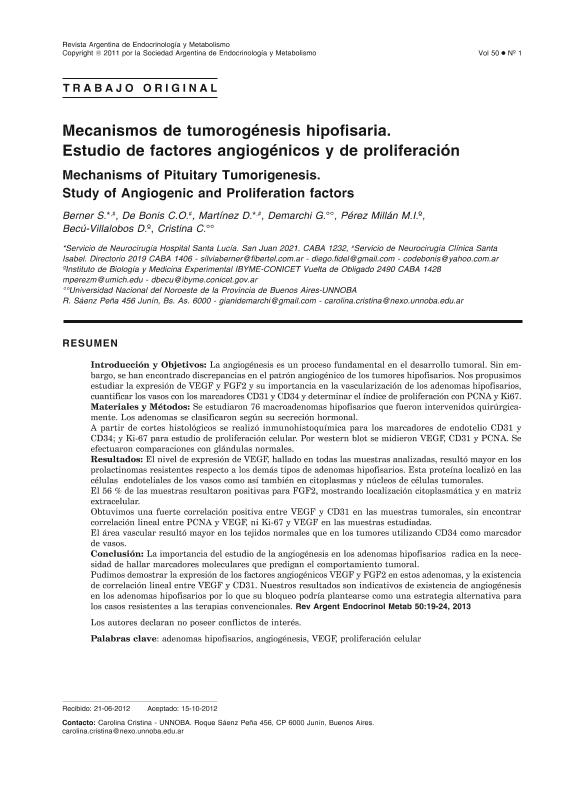Artículo
Mecanismos de tumorogenesis hipofisaria. Estudio de factores angiogénicos y de proliferación
Título:
Mechanisms of Pituitary Tumorigenesis. Study of Angiogenic and Proliferation factors
Berner, Silvia Inés; de Bonis, Cristian; Martinez, Diego; Demarchi, Gianina ; Pérez Millán, María Inés
; Pérez Millán, María Inés ; Becu, Damasia
; Becu, Damasia ; Cristina, Silvia Carolina
; Cristina, Silvia Carolina
 ; Pérez Millán, María Inés
; Pérez Millán, María Inés ; Becu, Damasia
; Becu, Damasia ; Cristina, Silvia Carolina
; Cristina, Silvia Carolina
Fecha de publicación:
03/2013
Editorial:
Sociedad Argentina de Endocrinología y Metabolismo
Revista:
Revista Argentina de Endocrinologia y Metabolismo
ISSN:
0080-2077
Idioma:
Español
Tipo de recurso:
Artículo publicado
Clasificación temática:
Resumen
Introduction and objectives: Angiogenesis is an essential process in tumor development. Nevertheless, discrepancies in the angiogenic pattern of pituitary tumors, in terms of hormonal phenotype, size or invasiveness have been found. Our aim was to study the expression of VEGF and FGF2 growth factors, and their importance in the vascularization of pituitary adenomas. We also quantified blood vessels with the endothelial cell markers CD31 and CD34 determining the vascular area, and the proliferation rate through PCNA and Ki67 index. Materials and Methods: We studied 76 pituitary macroadenomas that were surgically resected in the period between 2006 and 2010 from a total of 276 patients with this pathology. Adenomas were classified into prolactinomas (PRL), somatotropinomas (GH), corticotropinomas (ACTH), non-functioning (NF) and plurihormonal (Ph) according to their hormonal secretion. Samples were collected in formalin, embedded in paraffin, and immunohistochemistry was performed from histological sections for endothelial markers CD31 and CD34; and for Ki-67 to study cell proliferation. VEGF, CD31 and PCNA were measured by Western blot. We compared results with normal glands (N=6). Results: VEGF expression levels, found in all of the samples analyzed, were higher in resistant prolactinomas than in other pituitary adenomas. This protein was detected in endothelial cells of blood vessels and in tumor cells cytoplasms and nuclei. Fifty-six percent of samples were positive for FGF2, the other potent angiogenic factor studied, showing cytoplasmatic and extracellular matrix localization. We obtained a strong positive correlation between VEGF and CD31 in tumor samples, but we did not find lineal correlation between PCNA and VEGF, or between Ki-67 and VEGF in the samples studied. The vascular area was higher in normal tissues than in tumors when CD34 was used as endothelial cell marker. Conclussion: The importance of studying angiogenesis in pituitary adenomas lies in the need to find molecular markers that can predict tumor behavior. We could demonstrate the expression of VEGF and FGF2, two potent angiogenic factors, and the existence of linear correlation between VEGF and CD31. Our results are indicative of the existence of angiogenesis in pituitary adenomas; therefore the blockage of angiogenesis might be proposed as an alternative strategy for cases of resistance to standard therapy.
Palabras clave:
Adenomas Hipofisarios
,
Angiogenesis
,
Vegf
,
Proliferacion Celular
Archivos asociados
Licencia
Identificadores
Colecciones
Articulos(IBYME)
Articulos de INST.DE BIOLOGIA Y MEDICINA EXPERIMENTAL (I)
Articulos de INST.DE BIOLOGIA Y MEDICINA EXPERIMENTAL (I)
Articulos(SEDE CENTRAL)
Articulos de SEDE CENTRAL
Articulos de SEDE CENTRAL
Citación
Berner, Silvia Inés; de Bonis, Cristian; Martinez, Diego; Demarchi, Gianina; Pérez Millán, María Inés; et al.; Mecanismos de tumorogenesis hipofisaria. Estudio de factores angiogénicos y de proliferación; Sociedad Argentina de Endocrinología y Metabolismo; Revista Argentina de Endocrinologia y Metabolismo; 50; 1; 3-2013; 19-24
Compartir



